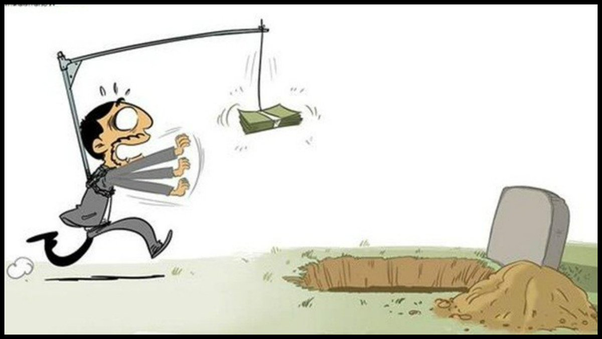
Fear, Greed & Management in 21st Century.
The change world has witnessed in 20th century is for more predominant than in 5 centuries earlier. But 21st century is generating an exponential visible variance. With the change happening so fast, every organization has to keep pace surviving. Till the last century any enterprise would be satisfied by a certain percentage of incremental growth every year in production, sales or profits. That was a linear growth. But in the current century entrepreneurs are hungry for exponential growth. So the game of the business has undergone a drastic change. Accordingly the enterprise owners have changed their HR policy and motivation techniques. Fear and greed’ can be commonplace among traders and can be rather damaging if not managed properly. Fear is often observed as the reluctance to enter a trade or the closing of a winning trade prematurely.
Employee motivation till now:
Motivation has always been recognized as essential driver for management. In order to ensure that the workforce move ahead as a team and contribute to the organization’s objectives. The business leaders recognized and carried out the certain procedures for enhancing productivity and keep to the staff motivated. These were positive initiatives which can be summarized as under:

1. Recognition.
First on the list is that the employees must have the feeling that the management recognizes that they are significant part of the organization. They contribute productively to the company’s mission.

2. How recognition motivates.
A person who is made to feel important applies his/her mind while performing any task. Further, application of mind results in the person enjoying the work which in turn motivates. Person recognition is one of the keys to successful person motivation. Person recognition follows trust as a factor in person satisfaction with their supervisor and their workplace.
3. Juniors too have innovative ideas.
Listening to the juniors promotes real participative conversation. The manger is able to understand their team. They know what to communicate and how to communicate to move the wheel of progress.
4. Engagement is critical.
A policy of systematic engagement encourages staff to take help of seniors at the time when it is needed. The efficiency increases and so also the satisfaction of the staff members.

5. Shop floor learning in the best starting point.
In traditionally managed family organization the owners would make their children to start from the bottom. If it is an engineering organization, working at the shop floor would be the first step for induction in the enterprise, and then gradually upwards. This helped workers to have a positive attitude towards the organization.
6. Mentors are more important than anyone would think.
An experienced senior was given the responsibility of mentoring. The mentor would ensure that the newcomer is exposed to each department. Doing the work is the best way to understand how to perform it. This would be considered as personalized training. All newcomers would be exposed to it irrespective of who they are.
7. Who said criticism has no role to play?
Positive feedback helped to keep anyone motivated. But appropriate criticism when necessary formed a part of training. This too ensured that person did not lose direction. Taking criticism can be a difficult thing. At some point in this arts world so dependent on reviews and opinions, you will encounter a customer or audience member – maybe even a reviewer – who wants to tell you how to do things better. It can be hard to deal with; after all, nobody likes to be told they’re wrong. But it’s not all bad news because sometimes you can use criticism to give you a competitive edge.

8. Time tested principal: Give & take.
Proper compensation and reasonable periodic enhancement too were taken care of. If a person is not able to meet family expenses, there would be some kind of pressure which dissociates and breaks the bond. Give and Take highlights what effective networking, collaboration, influence, negotiation, and leadership skills have in common. This landmark book opens up an approach to success that has the power to transform not just individuals and groups, but entire organizations and communities.
9. Delegation has a new name- Out sourcing.
All organizations need to outsource some of their activities. In times gone by the owners would allow the senior managers to start such small ancillary units and use the services or products. It would provide additional income. This also served to strengthen the bonds.
In the competitive business environment today, organizations which are hungry for growth have to adopt aggressive policies. Performance, sales and the bottom line are the chief parameters for appraisals. Generally, the CEO is engaged with clear understanding of producing some specific results. His/her compensation is fixed as per the promised results. So, it becomes their duty to live up to the promise. Fat compensation command fat results. Here, starts the story of Greed and Fear. For many organizations these two tools work as the chief motivators.

Greed had its toll, as always!
Fear and greed are two primal emotions which have been used as strong motivators for people to act. Normally insurance business relies on fear, stock market on greed. But today every CEO tends to use these.
The CEO who is hired the by the management using the above two tools, he/she uses the same for their subordinates. How else they would achieve some deadly targets? Due to fierce competition in the industry CEO and all have to slog and work like automatons 24×7. The good packages become just enough to meet the growing needs of the upscale lifestyle fear of losing the job becomes rampant. The situation has its heavy toll on the working people. Meeting impossible deadlines become deadly and people suffer. The story doesn’t end here. It only begins.
Most people engaged in the enterprise work under constant pressure and become stressed. Whenever genuine results are possible, it happens, but where the situation looks impossible, window dressing is employed. Manipulative reports and figures resembling mirage are displayed. An illusion of reality is created, which may last for a short time or at times even for a longer duration. But how long can illusory, self satisfying techniques last? The best known example of deceptive reporting is the story of subprime loan sanctioned in USA due to which some of the biggest banks fell.
Thanks for reading.












